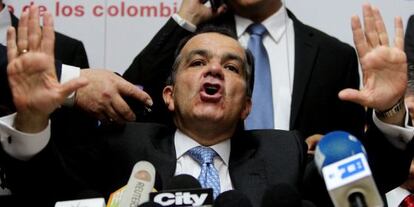Zuluaga’s message of fear seduces Colombian voters
President Santos’ rival has capitalized on the feeling that the government is selling out to the FARC Incumbent leader has failed to sell peace process convincingly in election race

The first thing that Óscar Iván Zuluaga did on Monday, a day after winning the first round of Colombia’s presidential elections, was to announce that if he is invested the country’s leader on August 7, he will suspend peace talks with the FARC guerrillas until all attacks on the civilian population come to an end.
By doing so, the opposition candidate set the agenda for the coming three weeks, when round two of the presidential election is to be held. He also reinforced the tough-on-terrorism image that has garnered him good results so far.
Meanwhile, President Juan Manuel Santos is struggling to defend the negotiations he began with the guerrillas in November 2012, which are the linchpin of his own re-election program.
The claims made by Zuluaga and other supporters of former president Álvaro Uribe on the subject of the peace talks – that Santos has sold the country out to the FARC, that he is making too many concessions, that he is allowing impunity for criminals – appear to have struck a chord among voters, 29.3 percent of whom supported Zuluaga on Sunday.
Many citizens fear that the peace talks will enable FARC leaders to participate in Colombian politics without first going to jail for their crimes, and Zuluaga’s campaign has zeroed in on this feeling.
The FARC did not help President Santos build a positive message that would be favorable to peace”
After saying that he would halt the process until the guerrilla group declares a unilateral ceasefire, Zuluaga did go on to show some openness to allowing reduced convictions for FARC members to convey an image of moderation. “For the sake of peace, we are ready to seek a reduced conviction in the order of six years or so,” he said in a press conference.
Ariel Ávila, a researcher at the Peace and Reconciliation Foundation, believes that this is simply an attempt “to attract undecided voters and to move to the center [of the political spectrum]. His conditions would practically destroy the process,” he says.
A widespread mistrust of the guerrillas’ real intentions after three failed negotiations is dragging down Santos’s bid for re-election.
“Zuluaga won because he was really in sync with a vision that feels that peace can only be won by continuing the war until the guerrillas are forced to submit to the law,” says María Victoria Llorente, director of the Ideas for Peace Foundation.
This analyst believes that the results of last Sunday’s elections, which saw the lowest turnout in 20 years, mean that “very few Colombians are interested in this process with the guerrillas.”
Santos’ big mistake, analysts agree, was his failure to sell the peace process convincingly.
Citizens fear the peace talks will enable FARC leaders to participate in Colombian politics without first going to jail
“He did not send out clear messages. This is not a process in which obscure agreements are being reached between a ruling elite and a guerrilla elite, but an agreement that is trying to get benefits for certain Colombians who have been forgotten for decades,” says Llorente.
The analyst Laura Gil agrees. “Santos was never able to construct a narrative about a Colombia at peace, and the message of fear finally took over, the fear that the FARC are ruling this country, and people believed it.”
Meanwhile, FARC’s own contradictions have benefited Zuluaga and harmed Santos. Pedro Medellín, an editorial adviser at Semana magazine, says “the FARC were very clumsy, they did not help President Santos build a positive message that would be favorable to peace.”
Recent attacks against police that resulted in civilian deaths have raised questions about the FARC’s commitment to peace.
Now, Santos and Zuluaga are busy trying to convince the three other candidates who did not make it into the second round – the conservative Marta Lucía Ramírez, the leftist Clara López and Green Alliance’s Enrique Peñalosa – to support them. It is likely that Ramírez will back Zuluaga because of their similar ideology. But Santos has more of an uphill struggle to convince the left (two million votes) and the center-left (a million votes) to support his campaign.
Tu suscripción se está usando en otro dispositivo
¿Quieres añadir otro usuario a tu suscripción?
Si continúas leyendo en este dispositivo, no se podrá leer en el otro.
FlechaTu suscripción se está usando en otro dispositivo y solo puedes acceder a EL PAÍS desde un dispositivo a la vez.
Si quieres compartir tu cuenta, cambia tu suscripción a la modalidad Premium, así podrás añadir otro usuario. Cada uno accederá con su propia cuenta de email, lo que os permitirá personalizar vuestra experiencia en EL PAÍS.
¿Tienes una suscripción de empresa? Accede aquí para contratar más cuentas.
En el caso de no saber quién está usando tu cuenta, te recomendamos cambiar tu contraseña aquí.
Si decides continuar compartiendo tu cuenta, este mensaje se mostrará en tu dispositivo y en el de la otra persona que está usando tu cuenta de forma indefinida, afectando a tu experiencia de lectura. Puedes consultar aquí los términos y condiciones de la suscripción digital.








































